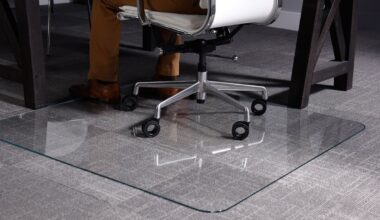Many users use their computer mouse on a wooden surface such as a wooden desk or table as they are easily accessible at home or office.
In fact, there is nothing wrong with using your desk as a mouse pad, as it feels as comfortable as using a mouse pad.
Using a computer mouse on a wooden surface is fine as long as it feels comfortable and ups your productivity but beware of its possible side effects such as wrist pain and device damages that may often come after prolonged use.
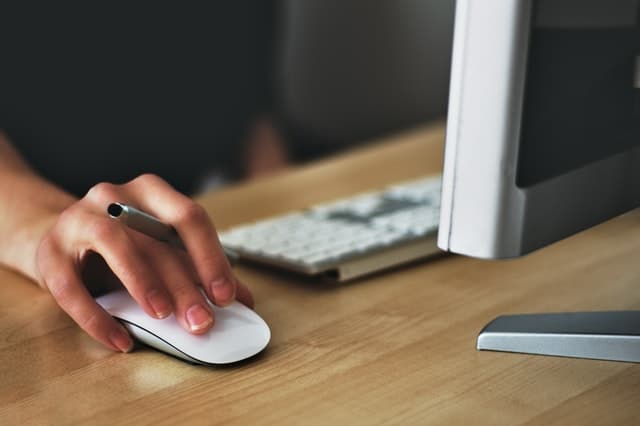
Remember, a wooden surface can be hard on the wrist and affect the finish of the wooden surface when continuously used.
However, using any wooden surface may not pose any problem for casual users who spend less time on the computer.
Want to know more? Read on to determine whether you correctly use your mouse on a wooden surface.
Table of Contents Show
Using Mouse on a Wood Surface
You can use your mouse on any surface as long as it does not affect the device’s performance.
Modern mouse manufacturers use cutting-edge technologies to make an agile device that functions smoothly on all surfaces; wood, glass, metal, or fabric.
Hence, using a mouse on a wooden surface should not be a problem!
However, not all mice are appropriate to use on the wood surface, nor is every wood surface suitable for computer mice.

A wood desk with a glossy finish or intricate decorations is less likely to be used as a mouse pad.
Even more so, the device could damage the wood surface by constant rubbing and rolling movements.
A study indicates that prolonged computer mouse use affects wrist posture above the critical angles, associated with increased carpal tunnel pressure.
Therefore, you should consider whether your mouse and activity are suitable for the wooden surface and vice versa.
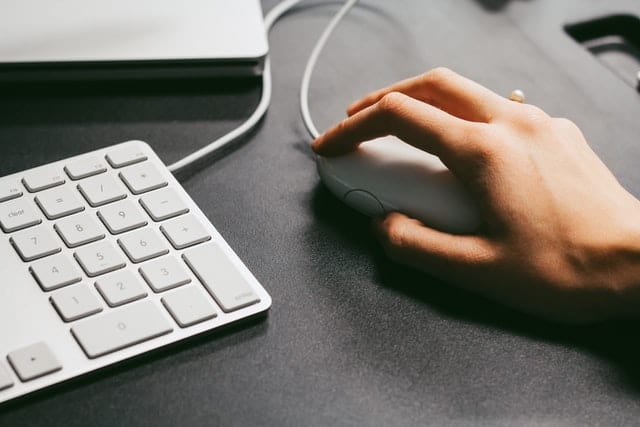
Here are a few pros and cons of using a mouse on a wooden surface.
| Advantages | Disadvantages |
|---|---|
| Modern mice are designed to be used effectively on a surface with tension with no lag-time or drop in performance. | Constant rubbing and rolling movement of the mouse will gradually erase the color (polish) or finish of the desk and create scratches. |
| The hard wood surface offers more accuracy, aiming, and speed required by a gaming mouse. | The soft rubber feet of the mouse can wear down from constant friction caused by repeated motions |
| It eliminates jittery cursor movement and difficulty in dragging caused by fabric mousepads. | Clicking the mouse button will put more pressure on your palm and wrist when placed on a hard surface. |
| The wood provides a flat and stable surface for a smooth scrolling experience. | In the case of a laser mouse, dragging it on a rough, hard surface may damage the sensor. |
| The wood surface would not heat up, unlike the fabric mousepads. | The wood surface may affect the mouse’s response rate. |
Read our blog to find out whether a mouse weight affects your performance and wrist health.
Does Mouse Type Affect Its Use on Wood Surface?
Not really! Modern mice are designed to work on a hard, plain surface that offers friction.
Therefore, a wood surface is less likely to affect any mouse type’s performance.
However, an optical mouse (that emits LED light for detection) may encounter problems if the wood surface is glossy.
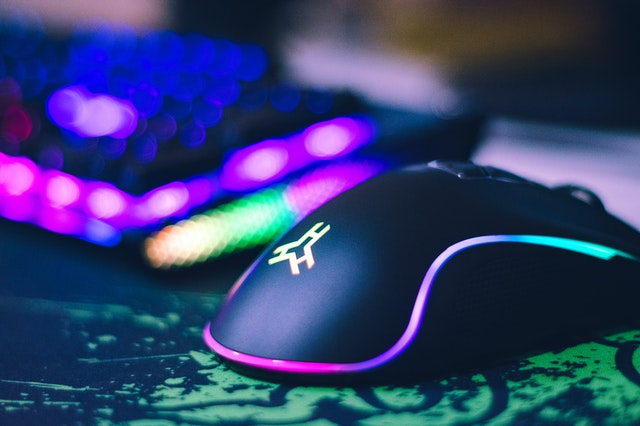
The glass-like finish on the desk is created by high gloss paint that protects the surface from dirt, grime, and liquid spills.
Unfortunately, it will affect the optical mouse’s movement because the glossy surface dramatically reduces the friction required to run the optical mouse.
On the other hand, a laser and old ball-style mouse would work effectively on a glossy surface.
Is Wooden Mousepad Good?
Indeed, a wooden mousepad would work just like any wooden surface. Using one will create a protective layer between the device and the desk to prevent damage.
Most gamers would even benefit from a hard mousepad, usually made from wood, glass, aluminum, etc.
A wood surface offers a more tactile response and is often durable, but you must ensure to buy a quality wood mouse pad.
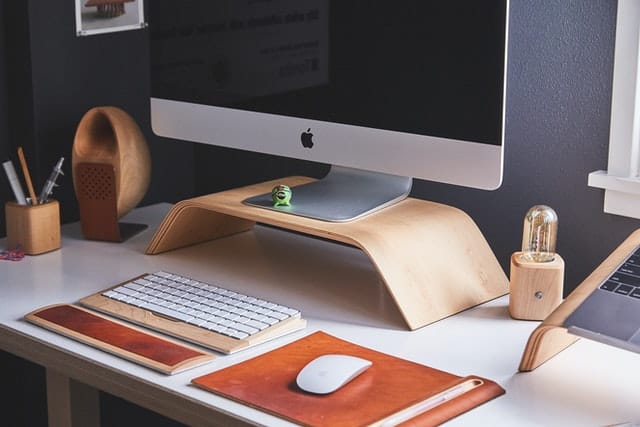
Moreover, using one will eliminate the problems of the mouse sinking and the pad sliding off the desk.
One big drawback of a wood mouse pad is that you cannot fold it to store or carry it around for mobility.
Here are a few quality wooden mouse pad recommendations.
| Mouse Pad | Specification | Image |
|---|---|---|
| Natural Wood Mouse Pad | Handmade from natural wood material with ash wood covering and non-slip underside. Dimension: 220x260x3 mm Weight: 106 g | 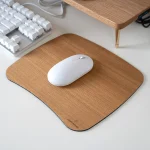 |
| Customizable Real Wood Mouse Pad | Handmade from natural wood and available in neoprene, hardwood, and mahogany walnut with an elegant touch to give a high-quality finish. Dimension: 220x260 mm | 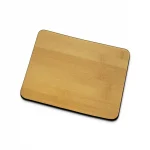 |
| Wooden Mouse Pad | Premium, eco-friendly natural wood mouse pad with a beautiful grain and moisture-proof properties. Features a non-slip rubber bottom. Dimension: 26x22 cm Weight; 120 g | 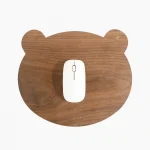 |
| Craft Kitties Wooden Mouse Pad | Made from natural eco-friendly wood with beautiful grain and design. It also boasts moisture-proof properties and a non-slip rubber bottom. Dimension: 26x22 cm Weight; 120 g | 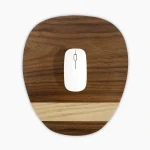 |
| Bamboo Mouse & Mouse Pad | Made from eco-friendly, natural bamboo material for elegance and durability. | 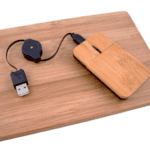 |
Find out what is the perfect mouse pad material for you.
Easy Mouse Pad Alternatives
Not everyone can get the hang of a wooden mousepad. For them are some worthy alternatives.
If you feel a wooden surface is inappropriate for you or cannot buy one, consider using these daily items instead.
1. Magazine
A magazine is bulky enough to stay in one place and has a smooth, even surface for mouse scrolling.
Moreover, magazines are found almost anywhere, reducing the cost to acquire new magazines.
However, ensure the magazine is thick and heavy enough for use.
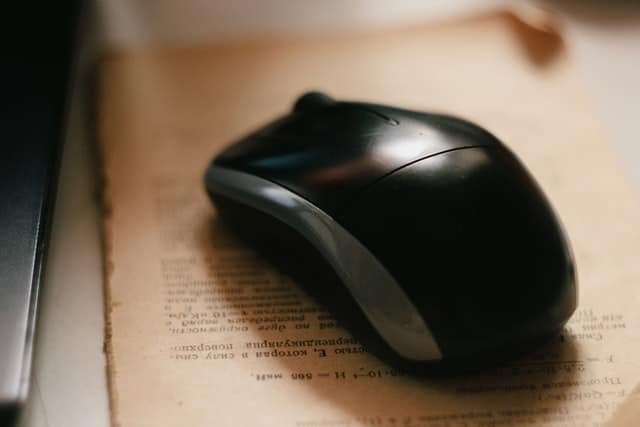
2. Cardboard
A cardboard or mountboard is another accessible item found around the house for a mousepad.
The plain surface and appropriate thickness make it an excellent mousepad alternative. Although they are not as smooth as magazines, they will do the job.
3. Placemat/Table Mat
Placemats are table mats with raised surfaces used to place items. They are readily available on the kitchen and dining table.
Placemats would make great alternatives when you do not have a good mousepad.
Ensure your placemat has a smooth surface and is not wet before using.
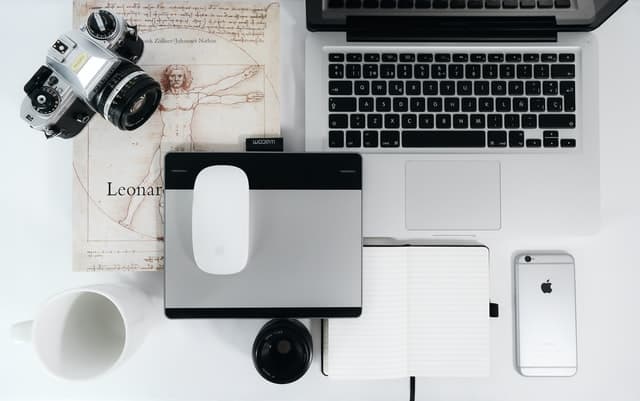
4. Newspaper
Newspaper is another readily available option for a mousepad.
A single layer of paper may not be an appropriate mousepad; hence consider taking a bundle and folding it to make a mousepad-like surface.
It would be thick and heavy enough to stay in place. Moreover, the paper would provide a smooth surface for a mouse movement.
5. A Hardcover Book
A hardcover book would work the same as the mousepad, as the hard surface provides support, resistance, and friction required to move a mouse.
They are large and heavy enough to stay in place when used. However, ensure to remove the glossy cover before using a hardcover book.
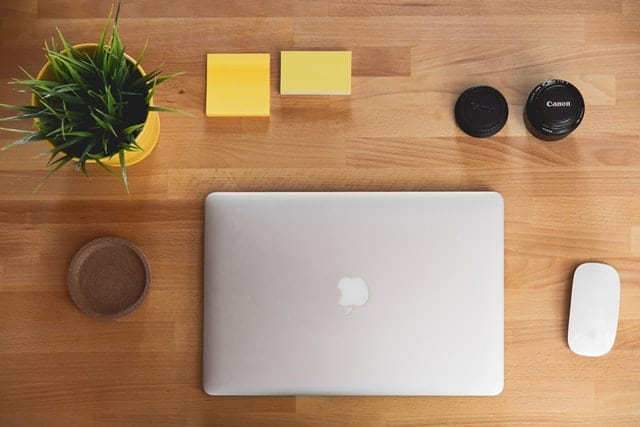
Final Verdict
Although computer mice work on almost any surface, the device’s response, accuracy, and durability will differ from one surface to another.
Choosing a wood surface can be wise because it offers the right amount of tactile response and accuracy required for mouse use.
However, you can always enhance the experience by adding a wooden mouse pad or other reliable alternatives.
You need not need a pad if you are using a mouse for casual use; however, having one will help protect your device and desk from damage.
Related Article: Can you use a mouse without a mouse pad?

